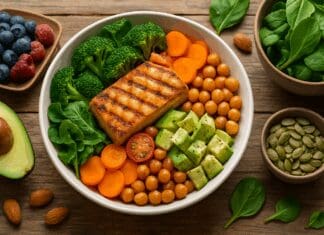Is Bread Good for Pregnant Women? A Vital Look at Nutrition...
Pregnancy ushers in a transformative period in a woman's life, not only emotionally and physically but also nutritionally. The question of dietary choices becomes more pressing, as expectant mothers are not just eating for themselves but for the growth and well-being of their developing baby. One question that often arises is, is bread good for pregnant women? This seemingly simple inquiry opens the door to a broader exploration of carbohydrate intake, nutrient density, potential health risks, and the role of different types of bread in supporting a healthy pregnancy.
The Ultimate High Fiber Diet Meal Plan for Sustainable Energy and...
In today’s fast-paced world, where fatigue, digestive discomfort, and dietary confusion run rampant, many are turning to smarter nutrition strategies to reclaim control over their energy levels and well-being. A thoughtfully crafted high fiber diet meal plan can do just that—offering sustainable energy while supporting a balanced gut microbiome, improved digestion, and long-term health. Rooted in both ancient dietary wisdom and cutting-edge nutritional science, high fiber eating isn’t just about adding bran to your breakfast; it’s a holistic approach that transforms how your body functions from the inside out. When thoughtfully implemented, such a plan fuels consistent vitality throughout the day, supports metabolic health, and fosters a gut environment teeming with beneficial microbes, essential for everything from immune resilience to mental clarity.
Essential Health Benefits of Drinking Milk While Pregnant Every Mother Should...
Pregnancy is a transformative phase marked by profound physiological and emotional changes. As expectant mothers navigate this crucial journey, nutrition emerges as a cornerstone of both maternal well-being and fetal development. Among the numerous dietary choices available, milk holds a longstanding reputation for supporting maternal health. The benefits of drinking milk while pregnant extend far beyond mere tradition or convenience; they are grounded in scientific understanding of maternal-fetal nutrition. Incorporating milk into a balanced pregnancy diet offers essential nutrients that contribute to the health of both mother and baby, reinforcing its role as a vital component of prenatal care.
The Vital Health Benefits of a No Red Meat Diet and...
Adopting a no red meat diet is an increasingly popular choice for individuals striving to improve their overall health, manage chronic conditions, and promote sustainable dietary habits. As research continues to shed light on the health implications of red meat consumption, particularly processed and high-fat varieties, more people are turning toward plant-based or diversified meat and vegetable diet patterns that limit or eliminate red meat altogether. This transition not only aligns with health-conscious goals but also reflects growing awareness of environmental sustainability and animal welfare. For those considering dietary changes, understanding the nuances and benefits of a no red meat diet is essential to making informed, health-positive decisions.
The Essential Guide to Mediterranean Fruits and Their Powerful Role in...
In the landscape of nutritional science and preventive medicine, few dietary patterns have garnered as much praise and enduring relevance as the Mediterranean diet. At the heart of this plant-forward approach lies a diverse and colorful array of Mediterranean fruits, each offering a unique profile of antioxidants, fiber, vitamins, and phytonutrients. These fruits not only contribute to the sensory richness of Mediterranean cuisine but also play a pivotal role in supporting cardiovascular health. Their inclusion in daily meals exemplifies the synergy between flavor and function—where nourishment meets longevity.
The Vital Role of Niacin Vitamin B6 in Pregnancy Nutrition and...
Pregnancy marks one of the most transformative and nutritionally demanding periods in a woman's life. Amid the influx of guidance on prenatal care, the importance of specific micronutrients often becomes buried beneath broader dietary recommendations. Yet certain vitamins hold critical roles that cannot be overstated. Among these, the synergistic functions of niacin vitamin B6 stand out as pivotal to the health of both the mother and her developing baby. Proper intake of these nutrients influences neurological development, energy production, and hormonal balance, making their role in maternal wellbeing an essential consideration in pregnancy nutrition.
7 Vital Reasons to Choose Yogurt for Pregnant Women’s Diet
Pregnancy marks a pivotal journey of transformation, demanding the utmost attention to nutrition, especially when it comes to daily food choices that affect both the mother and the developing fetus. Amid the myriad of dietary recommendations, one staple that deserves special consideration is yogurt. Incorporating yogurt for pregnant women into daily meals provides an accessible and nutritious way to support maternal health and fetal development. With its unique profile of vitamins, minerals, and probiotics, yogurt not only enhances digestive function but also supports immune health, bone integrity, and emotional well-being. This article delves into the multifaceted benefits of yogurt during pregnancy, revealing why it is often regarded as one of the best pregnancy snacks that combines taste, convenience, and health in one powerful package.
The Essential Guide to Safe and Effective Protein Shakes While Pregnant
Pregnancy is a transformative journey that brings about profound physiological changes, increased nutritional needs, and a renewed focus on maternal and fetal health. One of the most frequently discussed aspects of prenatal nutrition is protein intake. Protein is vital for fetal growth, maternal tissue expansion, and hormonal balance. As dietary routines evolve during pregnancy to meet these increased demands, many women find themselves exploring new, convenient sources of nutrition. Among these, protein shakes have emerged as a practical and often necessary option. However, the growing popularity of protein shakes while pregnant has also raised important questions about safety, effectiveness, and ingredient quality. This comprehensive guide provides evidence-based insights, expert advice, and practical strategies to help expectant mothers navigate the landscape of protein supplementation during pregnancy.
Essential Pregnancy Tips on How to Get B1 for Maternity Wellness
Pregnancy is a unique physiological journey that places increased demands on a woman’s body, requiring careful attention to nutritional intake to ensure both maternal and fetal health. Among the essential nutrients, vitamin B1—also known as thiamine—plays a critical role in energy metabolism, neurological development, and muscular function. Knowing how to get B1 for maternity wellness can significantly support a healthy pregnancy and postnatal recovery. Thiamine is indispensable for converting carbohydrates into usable energy, supporting the heart and nervous system, and fostering optimal brain development in the growing fetus. Yet, it is often overlooked in prenatal care discussions. This article explores in depth the critical importance of vitamin B1, how to naturally and effectively obtain it, and what expecting mothers should consider in balancing their thiamine intake for overall wellness.
The Essential Guide to Safe Pregnancy Nutrition: Understanding Vitamin B2 Dosage...
Navigating nutrition during pregnancy is a journey marked by a series of critical decisions that significantly influence both maternal and fetal health. Amidst the extensive list of nutrients that require close monitoring during this time, vitamin B2, also known as riboflavin, emerges as a foundational element of prenatal care. Understanding the appropriate vitamin B2 dosage per day is vital for ensuring that both the expectant mother and her developing baby receive the necessary support for optimal growth, energy production, and metabolic function. This article offers an in-depth exploration of vitamin B2's role in pregnancy, the optimal intake levels, dietary sources, and the potential implications of deficiency or excess, with the aim of empowering pregnant women to make informed, evidence-based nutritional choices.
















